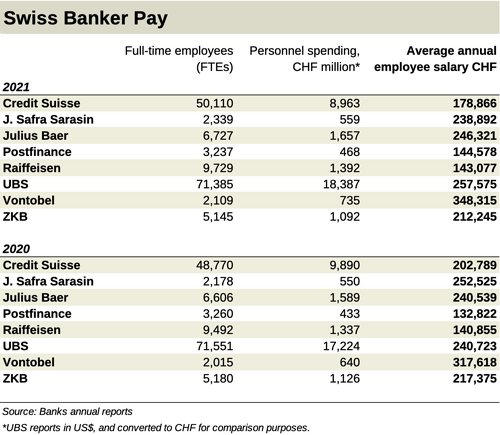Swiss Banks' Record Year Brings Better Pay For Some
Swiss banks are coming off an excellent year. But not everyone is getting a fair shake when it comes to salary, a finews.com analysis shows.
Vontobel may have recently experienced a change at the top with chairman Herbert J. Scheidt's retirement. But they also have the top payroll in Swiss banking. On average, the more than 2,100 employees in the Zurich-based investment house made slightly more than 348,315 Swiss francs ($370,000) a year, at least when you compare the number of full-time employees against personnel expenses (see table below).
From the looks of it, they have left everyone else in the dust, regardless of whether they work in a major bank, a government-owned institute, a cantonal bank, or a wealth manager.
Vontobel was one of the banks benefiting from a record year in 2021. Profit was up by almost half -– or 48 percent – at 384 million francs. For good measure, UBS reported its highest net profit in 15 years, something Switzerland's largest bank seems to emphasize repeatedly to anyone within earshot. By most takes, the roughly 10 percent rise in salaries at both institutes seems to mirror business developments.
The same is likely true for the private banks in Geneva and Zurich, which do not disclose personal expense figures. At least not yet.
Controversial Bonus Program
The question of banker compensation will probably lead to a great deal of talk at this year's fledgling AGM season, particularly for institutes that experienced considerable turbulence despite the extraordinarily positive market environment.
One of the first that comes to mind is Credit Suisse. Because of a series of well-publicized debacles, the country's second-largest institute hemorrhaged well more than a billion last year and that was reflected in compensation levels. Average annual salaries fell by 24,000 francs even though the number of full-time employees increased slightly.
The finance sector continued to justify its notoriously high levels of pay by saying it has no choice but to pay market rates. That meant that Credit Suisse was caught in a quandary and it had to find a way to prevent an exodus of unsatisfied employees. To salvage the situation, it created a controversial bonus program for higher levels of executive management aimed at keeping them in place for the next three years.
Hard-pressed Business Model
Credit Suisse is pretty much alone - almost. The finews.com data shows that average salaries also fell at Brazilian-Swiss private bank J. Safra Sarasin. There, a significantly higher pool of employees seems to be sharing a very modest increase in salaries. But the overall level of compensation is decidedly higher than it is at Credit Suisse. The average salary at J. Safra Sarasin was 238,892 francs in 2021 against 178,866 francs at Credit Suisse.
Employees at the Zurich Cantonal Bank also had to tighten their belts. Fewer of them seem to be sharing less in overall pay.
Otherwise, everything else is pointing up. Postfinance, which is one of the most systemic-relevant institutions in the country, although it cannot make loans, is being forced down an entirely different path. Average salaries are up as a result of the significant increase in profit. But the prolonged low rate environment has put its business model way out of whack, with no relief in sight from the government.
Google and Tech Pay More
Even though banker pay remains high, it no longer pays the most. As recruiters have been saying, the Basel-based pharmaceuticals and the Swiss branches of the tech giants such as Google pay far more. And right now the competition is particularly intense for IT experts, something that practically every sector is tearing their hair out about.
Recruiters in finance are having to think up something new to attract them. That was likely one of the reasons Zurich-based private bank Julius Baer showed up on the Roblox online gaming platform. It was a way of garnering at least some attention.
Additional reporting: Marco Babic, Samuel Gerber





























